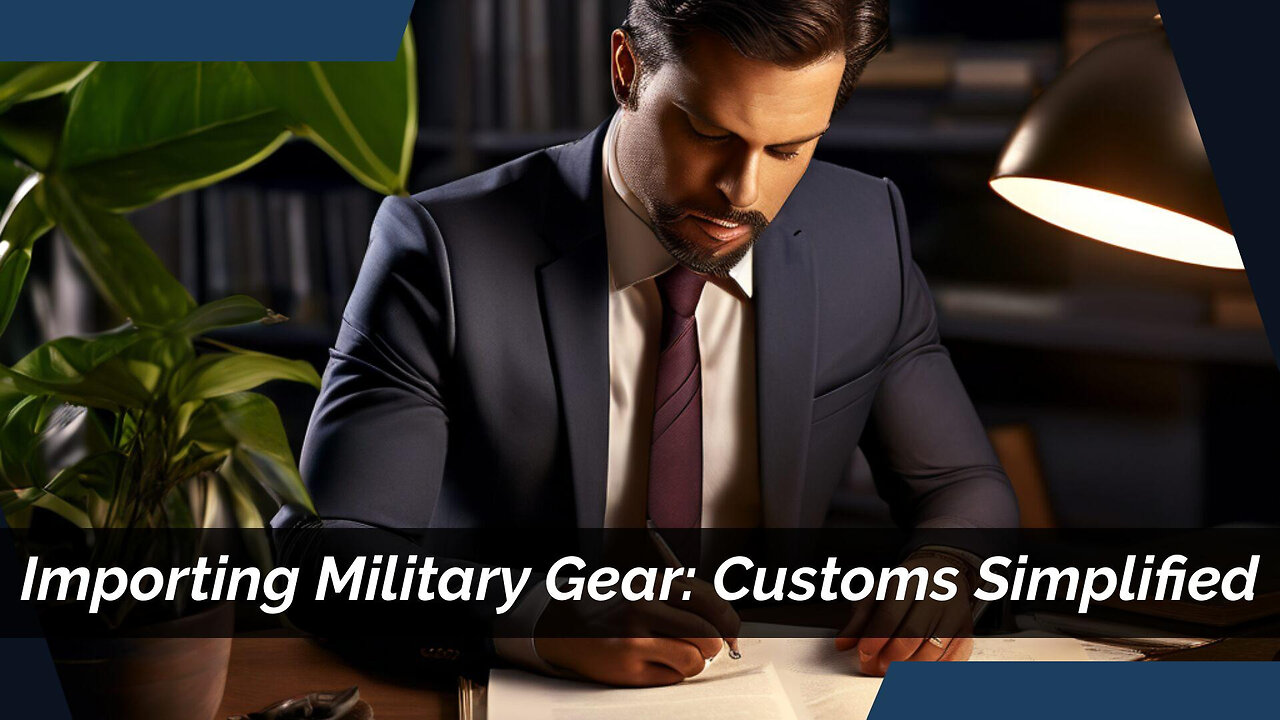Premium Only Content

Navigating Military Equipment Imports: Understanding Customs Import Procedures
ISF Depot // 800-215-
Importing military equipment involves complex customs procedures due to its sensitive nature and stringent regulations. This video discusses key requirements and steps involved in importing military equipment. Firstly, obtaining a customs bond is crucial to provide financial guarantee for duties, taxes, and fees. Importer Security Filing (ISF) should also be filed, providing detailed information about the goods. Working with a reputable customs brokerage firm is essential for navigating the complexities and ensuring compliance. Upon arrival at the port of entry, customs inspection is carried out to verify compliance and necessary permits and licenses are required. Non-compliance can lead to penalties and legal consequences.
#CustomsBrokerage #InternationalTrade #MilitaryEquipmentImport #CustomsBond #ImportCompliance #CustomsInspection #CustomsRegulations #ISFDepot #CustomsExpertiseImporting military equipment requires a deep understanding of customs import processes, regulations, and licensing requirements. Compliance with the International Traffic in Arms Regulations (ITAR) is crucial, and importers must register with the US Department of State and obtain the necessary licenses. Importer Security Filing (ISF) requirements must also be followed, and the customs value of military equipment must be accurately declared. Import duties, tariffs, and customs bonds may be applicable. Working with a licensed customs broker experienced in handling military equipment imports can ensure a smooth and compliant import process.
#MilitaryEquipmentImports #CustomsImportProcedures #ComplianceRegulations #ITAR #CustomsClearance #CustomsBrokerage #ISFRequirements #DutyObligations #InternationalTrade #CustomsValueAssessment1845 // customs@isfdepot.com // www.isfdepot.com
In this video, we dive into the customs import procedures specifically for military equipment. We emphasize the importance of understanding the rules and regulations set forth by the US Customs and Border Protection (CBP) and the Department of Defense, as military equipment falls under their jurisdiction. One crucial aspect is the requirement for a Customs bond, which acts as a financial guarantee to CBP and must be obtained before importing military equipment. Additionally, we discuss the significance of filing the Importer Security Filing (ISF) form at least 24 hours before the shipment is loaded onto the vessel. This form provides CBP with necessary information to assess potential security risks. We highlight the rigorous inspection process conducted by CBP officers upon arrival at the US port of entry, which includes physical examinations, document checks, and radiation screenings. Finally, we stress the importance of partnering with a reliable logistics provider to ensure safe and timely transportation of military equipment to its destination. Overall, importing military equipment requires careful planning, attention to detail, and compliance with strict regulations, and working with experienced customs brokers and logistics professionals is essential to ensure a smooth import process.
#CustomsBrokerage #InternationalTrade #MilitaryEquipmentImport #CustomsBond #ImportRegulations #LogisticsProfessional #ISFForm #CBPInspection #CustomsCompliance #MilitaryEquipmentShipment
Video Disclaimer Here: This tutorial is independent and not affiliated with any US governmental entities.
-
 LIVE
LIVE
Real Coffee With Scott Adams
1 hour agoCoffee with Scott Adams 11/24/24
2,332 watching -
 13:52
13:52
Hershberger's Kitchen
12 hours agoTwo Delicious Dip and Spread Recipes to Try, Inspirational Thought
50 -
 LIVE
LIVE
Sacred Sage
4 hours agoDaz3D: Attempting to Finish Zoe Conversation!
149 watching -
![[Stream #19 ] Gaming, Chatting, you know the drill!](https://1a-1791.com/video/s8/1/9/o/E/e/9oEeu.0kob-small-Stream-Sour-Pickle-100-Foll.jpg) LIVE
LIVE
OneRandomDolly
1 hour ago[Stream #19 ] Gaming, Chatting, you know the drill!
267 watching -
 11:07
11:07
TimcastIRL
1 day agoElon Musk Suggests He’ll BUY MSNBC, Joe Rogan Will REPLACE Rachel Maddow
31K43 -
 34:24
34:24
The Rubin Report
19 hours agoFormer CEO: The Aftermath of Vice Media & What's Next for Mainstream Media | Shane Smith
39.3K5 -
 LIVE
LIVE
tacetmort3m
1 day ago🔴 LIVE - BECOMING THE UNTOUCHABLE (RADIATION WHO?) - STALKER 2 - PART 3
385 watching -
 16:05
16:05
China Uncensored
15 hours agoAnother Car-Ramming Strikes Outside a Chinese School!
4.62K11 -
 9:26
9:26
Dr. Nick Zyrowski
6 hours agoAnti Inflammatory Foods | You MUST Eat These!
2.75K1 -
 15:40
15:40
Bearing
2 hours agoEnd Stage Trump Derangement | Rosie O'Donnell is NOT Doing Well 😬
1.74K24